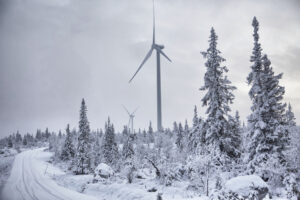I’ve often thought I should start a new kind of psychological therapy, one I call the Get Real School. Instead of listening to neurotics moan about their childhood toilet-training traumas, I’d have them discuss what their adult beliefs are, and we’d explore how sensible their concerns and plans are. If it took off, I’d expect that California’s and the European Union’s energy supplies would benefit greatly from this therapy if only I could get their leaders into my office.
They have ignored utterly the need for energy reliability, discounted cost to consumers, overestimated the capacity of renewable energy, and underestimated energy demands. They do so based on the ridiculous concept that man can control the climate. To that end everything from cow flatulence to clean-burning natural gas must be stemmed in place of wind, sun and water. In the process, of course, they increase their own power over virtually every aspect of life within their domain.
It’s still mild in Europe right now, though winter is coming, a time when demand is always greater, and yet even in a more benign fall there’s been a substantial shortage of energy and as a result an incredible increase in energy costs to consumers.

To infinity and beyond!
Blame it on the North Sea winds which suddenly stopped blowing if you wish. I blame it on ludicrous energy policies. What do you do when the wind stops blowing (one-twenty fourth of its normal electrical production) and the windmills stand still? You rely on fossil fuels. To make up the shortfall, gas and coal-fired electrical producing plants are forced into play as backups.
British political geniuses counted on the wind farms to do away entirely with net carbon emissions by 2050. This may seem odd to officialdom’s deep thinkers, but just as man can’t control climate, so also he cannot control wind or sunshine or rainfall, either. Well, you might say, the U.K. is lucky to still have backup fuels to pick up the shortfall. But, no, the same central planning that counted on wind has also set up a system of purchasable carbon credits to offset the use of such fuels. Quite naturally, the price of those "credits" is soaring as the need for them increases. More sensible planners would have provided for suspension of the carbon-credit system when there’s an urgent need for them, but, of course, they did not.
How substantial will the hit to the pockets of U.K. consumers be? At the moment electricity prices in the U.K. are seven times higher than they were last September -- up to $395 a megawatt hour for power to be dispatched the next day. France, Germany and the Netherlands are also seeing substantial energy cost increases. Here’s how this works:
Gas is in short supply right now and renewables aren’t pulling their expected share, so utilities must buy more coal, and when they do they have had to buy more emissions allowances as well. And the increased costs have to be passed on to consumers -- directly for electricity (and indirectly through the higher costs of goods and services). So, wherever possible, energy producers have returned to gas and that meant gas prices have also shot up. Still, they are able to generate some electricity using these backups right now. But, despite this experience, the U.K. demands that all coal plants must close by 2024. When and if they do, the situation will certainly be more dire.
At the moment, the only companies that profit from the shift to wind power are U.S. exporters of liquified natural gas and Russian gas exporters. This winter, if the North sea wind blows, they better pray it doesn’t at the same time freeze the windmills or blow them down.

Um... hello?
California is also suffering from an electricity shortfall. And its plan is to allow more air pollution for 60 days. That state has been relying heavily on solar energy and wind. It also relies on hydroelectric power but drought and wildfires have limited the capacity of that source. The summer heat increases demand for electricity. So much so, that the state predicts a shortfall sufficient to power 2.6 million homes in the coming months.
To avoid that, it has requested that six natural gas units throughout the state be permitted to operate at maximum capacity “notwithstanding air quality or other permit limitations.” It will certainly be ironic if we see that closing some gas plants that operated under emission controls to save the environment now results in greater emissions because renewables proved insufficient, and the remaining gas plants were allowed to operate outside emission controls. While it seems not to have considered the consequences of its closure of fossil fuel generating plants, California suddenly seems to have noticed a cost-benefit issue, arguing to Secretary of Energy Jennifer Granholm that the power outages posed “a greater risk to public health and safety” than the greater emissions. The request was granted September 10. Let’s see what happens after the 60-day reprieve is up and the rest of the state’s green energy plan is implemented.
On a higher political level than California and the U.K., the game continues. John Kerry, the U.S. "Climate Change" envoy has been shuttling back and forth to India and China, the world’s greatest producers of carbon emissions in what is certain to prove a vain attempt to persuade them to shortchange their countries of vital reliable, affordable energy. At the E.U., despite rocketing carbon-offset prices due to the insufficiency of renewable resources to meet demand, their climate czar Frans Timmermans, the European Commission vice president, blathers on about that bloc cutting gas emissions “by at least 55 percent by 2030,” and offers up some big new thinking:
Even in Brussels there’s an occasional bright light. In this case it was Poland’s Anna Zalewska who noted citizens unfortunately will “pay for the ambitions of the E.U.” And the chair of the Parliamentary committee on the environment, who was all for the banning gas and diesel fueled cars, has contended that the notion of extending the carbon market to transport and buildings went too far. "Because we believe that the political cost is extremely high, and the climate impact is very low.”
What he’s really afraid of is massive social protests against such loony fiddling of something as basic to life as energy. And he should be. Winter’s just around the corner, European gas supplies are short and it’s a struggle, in any event, to get their older gas plants back on line. It may well prove that a E.U. Christmas means there will either be coal in the people’s electric plants or in the E.U. bigwigs' Christmas stockings.
Article tags: California, carbon emissions, climate change, Energy, fossil fuels, net-zero, Oil and Gas, U.K.
I meant ‘intermittency’.
======
Well, the science is settled. Mankind I mean human kind can control the temperature of the earth and a man can be transformed into a woman and vice versa. This is what the nomenklatura believe and the rest of us will pay the price.
Intermittently and poor power density are insoluble problems for the renewable industry.
Instead we get poor politicized science, mandates and subsidies; the economy suffers and the poor, especially the poor, suffer and suffer in oh so many ways. Let me count....
=========